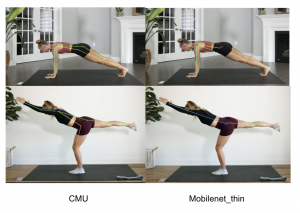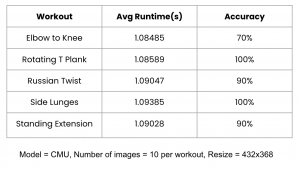This week I successfully installed OpenPose on my laptop and tested it with some images and videos. It took a very long time for OpenPose to run and the frame-rate was only 0.1 fps, so we decided to switch from OpenPose to TensorFlow OpenPose. TensorFlow OpenPose is a library based on the original OpenPose, which lacks some features (such as hand detection) but runs much faster. It is also compatible with TX2, which is the board we decided to use.
After installing tf-openpose, since there are 4 different models included in the library, I ran a set of 50 images with each model to test the runtime and accuracy. It appears that the CMU model is obviously the most accurate one; since we want high accuracy for our project, we will use the CMU model though it takes much longer than the other models.


I also tested tf-openpose with images from different workouts videos to get a better sense of the performance. These results give me a general idea of which poses are harder to detect, and I will try to improve the accuracy by preprocessing the images (rotate, resize, etc.).

I think we are on schedule. Next week I will present our design presentation and work on pose alignment and comparison.
